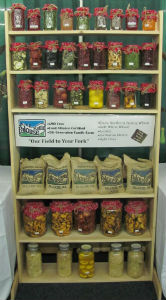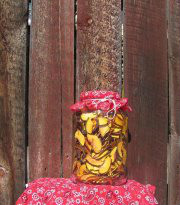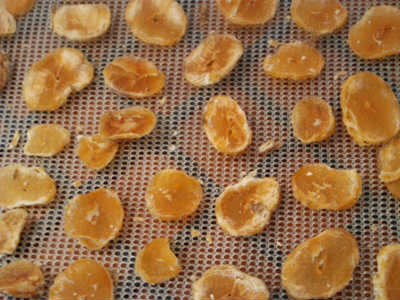We just finished a wonderful weekend in Dallas, Texas, as a store and as teachers, at the Self-Reliance Expo. What a wonderful venue—if you ever have one come near you, please take the time to go. You’ll find a wide variety of things, from homeschooling to homesteading to survival supplies.
The first reaction most people have when walking into our store is this—they head straight to our “pantry”, a 6 foot shelf full of jars. The colors range from the bright yellow pickled eggs steeped in tumeric to the deep green of dehydrated spinach, to the red homemade jams and jellies. The fruit leathers, the jerky, the thinly sliced dehydrated peaches, and the raspberries that melt in your mouth—these draw passers-by into our booth. They take in the colors and produce.

“I didn’t know you could dehydrate that!”
“I tried dehydrating potatoes once but mine turned black.”
We love these conversations because we often learn something new, too. We also find that many questions are echos of the ones asked by others coming to our booth earlier. Because of this, we thought that perhaps we’ll relate some common dehydration questions now in case you share them.
Q: How do I know if the food is fully dehydrated?
A: If this food item is going to be an immediate snack food, such as fruit leather or chewy apple rings, you will want to leave moisture in and dehydrate to taste. This will be based on your personal preference, and this process stops short of what you will need to store foods over long-term. If you are dehydrating for long-term food storage you should be able to hear a “clunk” when you drop it onto the table, or it should snap when you break it in half. Remember, these foods will partially rehydrate with moisture in the air (and start the rotting process) if you do not immediately package them properly.
Q: How do you clean out your dehydrator?
A: The bottom of an Excalibur is easily wiped clean with a cloth and your cleaner of choice, but it is true that the sticky trays are sometimes frustrating. We found a foolproof way (through a customer’s brilliant suggestion) to clean the trays. Run warm water in your bathtub and add Epsom Salts. Let the trays soak overnight. They will usually only need a quick rinse when you return to them. If they need further cleaning, it will just be a simple wipe-down.

Q: Those jars are beautiful—where did you get them?
A: Many are standard canning jars and we pick as many up as possible at thrift stores and yard sales. Others are empty product jars, such as spaghetti sauce. We always save glass jars!
Q: Can I put my food in glass jars for long term food storage?
A: Yes! Any jar of spaghetti sauce that comes home from the store with us is on a one way trip. After the commercially packed contents are consumed, we save the jar. Why would we do that? Because the jar can either go into the waste pile or the asset column. If I preserve part of my food surplus, I will need to put it some where. A glass jar is impermeable by vermin, is portioned properly for use (I do not want to open up a 5 gallon bucket of cornmeal when I only need 4 cups).
The biggest variable is the lid of the jar. If the vulcanized rubber ring on the inside of the far is still pliable when you poke it with your finger nail, then chances are it will seal just fine with an oxygen absorber on the inside of the jar. If the oxygen absorber is valid, it will mitigate the oxygen and create a seal. Keep your long term food storage in a dark, cool place, and remember to ROTATE!
Q: What considerations are there for storing dehydrated food?
A: There are four enemies of food storage: Moisture, Oxygen, Light and Heat. Any living thing needs moisture and oxygen to live. Dehydrating will eliminate the moisture. The oxygen can be mitigated with an oxygen absorber. This also (depending on the condition of the jar and lid) create a sealed container where the “button” on the lid does not pop. Lastly you need to protect the food from light. The energy carried on a ray of light will have a negative effect on the nutritive value of the food according to the Second Law of Thermodynamics. If you store the food in a mylar bag, this is much better for protecting from light. Lastly heat, think cool and a dark place for your food storage.
Q: What is “case hardening”?
A: It is when the outside of the food dries out too quickly and the interior has moisture locked in it. When I am trying to cook a roast, I set the oven to a high temperature and put the meat in there to sear the outside, then continue to cook it a much lower temperature so that it stays juicy. When I want to dehydrate a food, I want to avoid doing that. Dehydrating is best done with low heat over a longer time. Case hardening is when the outside is dry and the moisture has sealed into the interior of the food product and it will deteriorate and rot. There are a few things that can cause this. Many dehydrators have the bottom-to-top heating unit that means some trays get too much heat while others are dried insufficiently which requires rotating the trays. Because of this, we highly recommend a dehydrator like the Excalibur because of the back-to-front design where all trays heat evenly. We also recommend lower heat for a longer time! Even using Excalibur’s suggestions, we typically turn the heat down ever-so-slightly and plan for a longer dehydration time (36 hours is typical).
Q: What is “blanching” and do I need to do it?
A: Foods that are high in cellulose and fiber such as a carrot will need to be blanched. I suggest looking at the Preserve It Naturally book for food-by-food instructions as to whether an item needs this process. (Note: We give this book free with the purchase of a 5 tray or a 9 tray Excalibur Dehydrator or you can purchase the book separately). Blanching softens the outer skin of food and is easy to do. Get a pot of boiling water and drop the food in very briefly. Blanching does not generally take more than a minute or two (if you are at a full rolling boil). Other items can be quickly steamed instead such as cauliflower. Items like a potato are best to be boiled thoroughly until cooked, cooled, sliced then dehydrated.
Basically, foods with a thicker outer surface than interior, such as cherries and other berries, carrots, etc. should be blanched. If an item needs to be blanched prior to freezing, it should also be blanched prior to dehydrating. Here’s our favorite trick: If you find frozen vegetables on a great sale, stock up! Any items that require blanching will have already received the necessary treatment by the vegetable packers. Just put the veggies straight onto the trays without thawing! You have now saved substantially in both the purchase, labor and in the storage.
Q: Did you really do this yourself??
A: This is our most common question, and I think that it conveys the notion that this is too much work or too difficult. The home economics of dehydration means that I save exponentially by being able to buy sale items in bulk and preserve my own summer harvest—no wasted spinach for us! With this in mind, dehydration and food storage becomes a natural way of life. An Excalibur Dehydrator is the work horse for the do-it-yourself food storage minded family. And yes, you can do it too. I promise.

